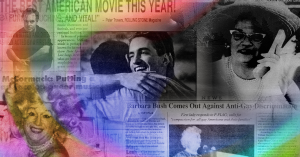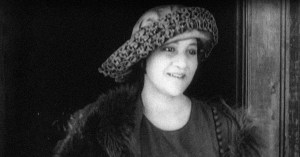Moon Knight Episode 1: The Revised Steven Grant Serves a Greater MCU Good
The debut episode of Marvel's latest Disney+ series reveals a departure from the comics that inspired it, and those changes are largely for the better.
After months of speculation, Disney+ and Marvel Studios have unleashed the first episode of Moon Knight. The series, starring Oscar Isaac as the title character and his two (for the moment) civilian identities, charts a new course for the ongoing tale of the Marvel Cinematic Universe. It is set in new locations. It features a hero unlike any we have seen in the mainline MCU. And, as far as we can tell, it is emphatically not an origin story — although we imagine Steven (Isaac) will learn his origin eventually. In fact, an origin, if only in a quick flashback, will answer a key question about his own existence.
Beyond that, though, the first episode also establishes a number of departures from not only the Moon Knight comic books but the way Marvel itself establishes and frames its Disney+ programs. So let’s take a look at some of the ways the television show does Moon Knight differently. Along the way, we might discover some of these changes may even be for the better.
Spoiler alert: The following reveals details about the first episode of Moon Knight on Disney+. Stop reading here if you wish to avoid spoilers.
The Personalities of Steven Grant
The most important thing to considering in Marvel Studios’ take on Moon Knight is its very different conception of Steven Grant. Back in the comics, he was presented as fairly sociable, charming, and financially savvy. Few personality distinctions really separated him from Marc Spector in the initial Moon Knight stories written by Doug Moench, and subsequent writers like Jeff Lemire and Max Bemis would establish him as Marc’s happier alter and, at least while he was growing up, best friend. But Steven’s disposition also came with a certain stated lack of combat prowess. Nevertheless, he was still an American – in fact, once it became clear Marc was Jewish, Steven became more gentile.
And it seems head writer Jeremy Slater initially intended Steven to more closely resemble his comic book counterpart in demeanor and country of origin before Isaac joined the series. As the actor explained during a press conference last week, he suggested making Steven a more meek, British character as the plot already had him living in England – a choice initially made to expand the Marvel characters out of Manhattan. Although Isaac’s accent has been criticized in various circles, it makes Steven a more distinct character from Marc. And if you’ve read any of those early Moon Knight stories, you know the differences between them were so slight that his girlfriend often had to ask which of his three major personas he was in at any given moment. On that front, the accent is an improvement in at least being an obvious signpost.
Read also: Oscar Isaac and the Moon Knight Cast and Directors Talk Character and Collaboration
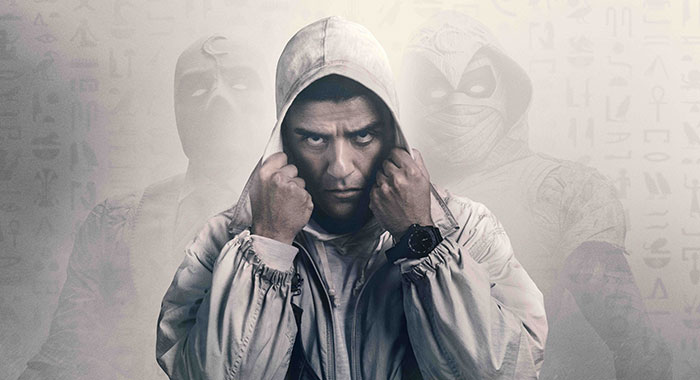
(Photo by Marvel Studios)
But it also introduces a question never in play in any of his Marvel Comics stories: Who is the true alternate persona? In the comics, Marc was always first. On the television series, we’d be inclined to think Steven is the original persona. The entire episode is presented from his point of view, and he seems more lived-in and has connections like a mother to chat with and difficulties at work. Granted, it is always possible his mother — who he always seems to leave messages for — may be part of the architecture of the Steven persona and Marc was first. Khonshu’s (F. Murray Abraham) apparent knowledge of Steven (as “the idiot”) also suggests that Marc is aware of his alter.
Well, presuming Khonshu isn’t also an alter.
Speaking of Moon Knight’s alternate identities, it is interesting we made it through the premiere without an appearance by the character’s third major identity: Jake Lockley. That alter mainly works as a cabbie in Manhattan, but the Lemire run of Moon Knight also established him as the persona willing to do the dirty work so Steven could maintain his innocence and Marc could remain “moral.” His absence certainly makes for cleaner storytelling, as Steven only really needs to deal with Marc for a solution to the current jackal problem, but considering Isaac’s card in the closing credits feature him with three faces, we imagine Jake will show up eventually.
Harrow Working on Ammit’s Behalf
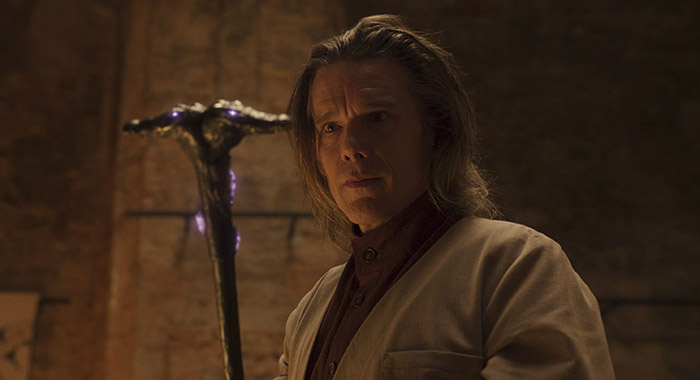
(Photo by Marvel Studios)
From the moment Ethan Hawke’s character name was revealed in a trailer earlier this year, many observers were puzzled by the inclusion of Arthur Harrow. Back in the comics, he was a one-time villain appearing in Moon Knight (Vol. 2) #2. His affinity for mad science could make him an interesting foe in a television context, but he lacked the personal connection Marvel villains often have to the title hero. Consequently, many assumed the name was a cover for a more classic Moon Knight foe like Bushman or Marc’s brother, Randall.
Instead, it seems Harrow works on behalf of a very different adversary: the Egyptian god Ammit. In true Egyptian mythology, she was the eater of hearts who lived near the Scales of Justice in the Egyptian concept of the underworld. Back in the comics, she appeared to be a foe of Moon Knight and Khonshu, but she may have also just been a psychiatrist treating Marc on and off across the years. Although, that doctor’s path also led to the sort of destruction and conflagration worthy of the deity. Since Ammit is said to devour the hearts of those judged unworthy by Anubis, everything Harrow does in this first episode, and even the use of his seemingly magical tattoo feels consistent with him directing events on her behalf. But to what end? Is it really just about putting Ammit in a position where she can judge the whole world preemptively?
Also, the power seemingly given to Harrow by Ammit suggests that the Egyptian pantheon is real in the MCU, and Khonshu is not another alter in Steven’s head. Granted, that revelation will probably offer him no comfort, but it may lead to some interesting discussion with various Asgardians in the future.
No Obvious Marvel References

(Photo by ©Marvel/©Walt Disney Studios Motion Pictures)
We have to applaud the producers of Moon Knight for showing restraint in regards to obvious ties to current MCU events. No mention is made of weird lightning storms in New York (Spider-Man: No Way Home), troubles with the GRC across Europe (The Falcon and the Winter Soldier), or even the Blip. The first episode of Moon Knight doesn’t even offer a suggestion of when it is occurring relative to other Phase Four shows or films.
To a great extent, this is to the show’s credit. If it continues, it means Moon Knight gets to serve as an entry point to the ever-expanding MCU story. That’s definitely a good thing, as viewers can just get to know Steven, Marc, Khonshu and the rest of the new characters without needing to know who was Blipped or if Harrow’s cult is made up of people avoiding repatriation by the GRC.
But then, wouldn’t it make sense for Harrow to target the people who feel helpless and hopeless in the face of the repatriation effort? Thematically, that would be a good tie to introduce. Of course, that may still turn out to be the case if Steven (or Marc) learns more about Harrow’s group. As it happens, eagle-eyed fans have spotted GRC ads on a London bus in one of the show’s many promos, so the concept may be reintroduced in a subsequent episode.
Also, isn’t it interesting that Harrow doesn’t mention Thanos (Josh Brolin) in his rundown of history’s greatest monsters? If not for those GRC ads, we’d suggest the show may be taking place in one of the alternate Marvel realities. Then again, there’s already so much mystery surrounding Steven’s life that trying to parse out where he is in the grand Marvel tapestry may be too much to ask of this show. Well, at least until the stinger scene at the end of the season, of course.
But Crawley Showed Up (Sort Of)
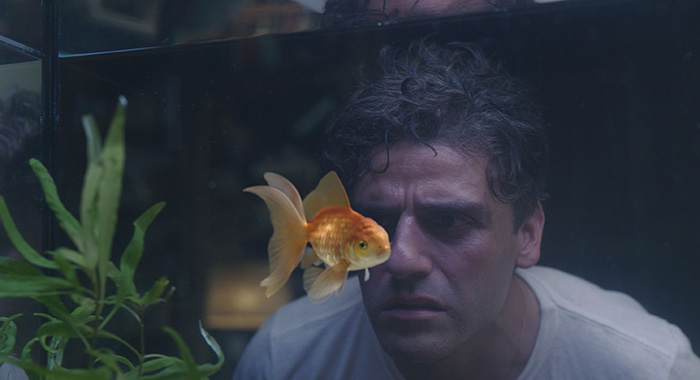
(Photo by Marvel Studios)
Despite the absence of those obvious MCU references, Jake Lockley, and the generally established Moon Knight supporting cast across 40 or so years of comics, we did get one constant from the various Moon Knight titles — sort of.
In the comics, Bertrand Crawley is part of Jake’s cohort — which also includes diner owner Gena Landers and her sons — as his “man in low places.” Generally portrayed as homeless or very close to it, he offers info to Jake for cash and, sometimes, food. In the early days, Gena and Jake would joke about his tendency to come into the diner with a used teabag and request hot water to use it repeatedly. Many years later, he made a noble sacrifice to save Marc’s soul. Well, provided any of that actually happened, of course.
In the television series, he makes a surprising appearance as the living mannequin Steven talks to after his long day at work. There, he is played by Shaun Scott, who is completely still the entire time. We only realized this was meant to be Crawley by spotting his name in the credits, and we find it so strange that out of all of the Moon Knight supporting characters, he would be established here. To be honest, we think it is more of a tip of the hat to the characters the show will not use than a suggestion that Crawley, Frenchie, Marlene, Gena, or her sons will filter into Steven’s life — see also the missed call from “Duchamp” (Frenchie’s last name) on Marc’s Razr. We are not entirely sure if this iteration needs those characters.
The presence of Frenchie’s name among a sea of missed calls from “Layla” – and Steven’s brief interaction with her over the phone — does leave us wondering about her. Thanks to press materials, we know the mysterious caller is Layla El-Faouly (May Calamawy), an archaeologist who is known to Marc. There are surprisingly few characters called Layla in Marvel Comics history, one being a Mutant with the ability to perceive changing realities, which she used to unlock the memories of characters effected by one of Wanda Maximoff’s most far-reaching warps of reality. We seriously doubt Moon Knight’s Layla will be the same character, but the series is also the most unlikely place for Mutants to make their MCU debut, so there is a surprise factor to consider. At the same time, her occupation as an archaeologist aligns her more with other members of Moon Knight’s supporting cast, including Marlene — the long time girlfriend of Steven in the comics — although Calamawy noted in a recent interview that she had fewer comics to draw upon and a freer hand in developing the character. Presumably, we’ll see her more fully next week and get a better handle on what she will mean to the series and, maybe, the MCU overall.







